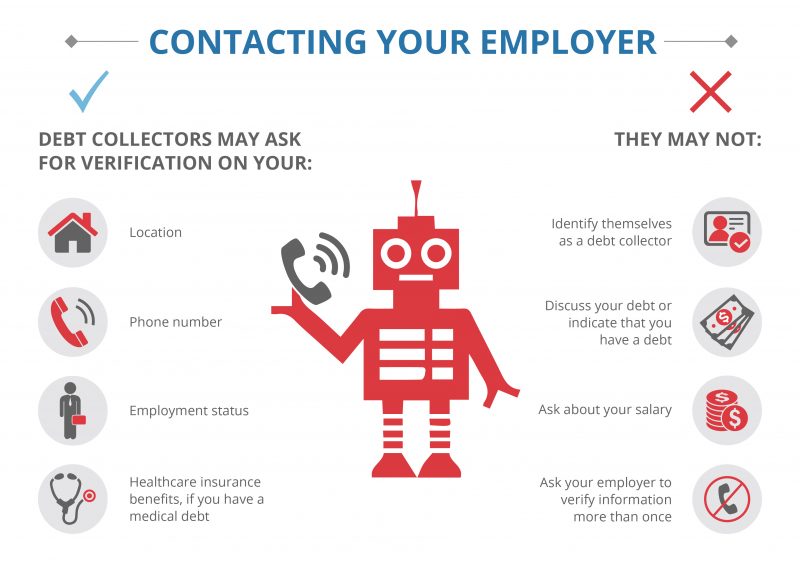- Lemberg Law
- FDCPA – Debt & Credit Complaints
- Debt Collection FAQ’s
- Can Debt Collectors Call You at Work?
Yes, a debt collector can call you at work. However, the FDCPA says they must stop calling if you ask them to or if you tell them you’re not allowed to get personal calls.
 Is it legal for debt collectors to call your job?
Is it legal for debt collectors to call your job?
The answer is yes. However, the Fair Debt Collection Practices Act (FDCPA) limits the ways a debt collector may communicate with you in the workplace. Under Section 805(a)(3) of the federal law, a debt collector may not call your place of employment if they know or have reason to know that your employer forbids these calls.
What should you do if you get a collection all at work?
There are three things you should do if you receive a collection call at work:
- Ask them to stop calling you at work.
- Jot down the date and time you asked the debt collector not to call you.
- Follow up with a written notification.
1. Picture this scenario: You receive a phone call about a “business matter” transferred to you from the receptionist. At this point, once you have determined the caller is a debt collector, simply tell them not to call you at work.
2. Document the date and time you made the request, along with name of the person with whom you spoke. This will come in handy in case your request is ignored and you decide to take legal action.
3. Once you’ve made the request, or even if a debt collector hasn’t called you at work but you know one is trying to reach you, you should send a request in writing. Inform the debt collector that they do not have permission to contact you at your workplace. While a verbal request is enough under the law, a written request provides you with a paper trail in case a debt collector violates the request.
What happens if the debt collector keeps calling you at work?
If a debt collector insists on contacting you at work even after you have asked them not to or told them you cannot receive calls at work for a particular time frame, on certain days, or at all, they can end up owing you money. You can sue the debt collector for $1,000 in statutory damages, attorney fees, and court costs. In Chiverton vs. Federal Financial Group, the court awarded money to the Chivertons because the debt collector continued to contact them at work after being told not to.
What about original creditors?
A third-party debt collector (from a debt collection agency or a debt buyer) is not the same as an original creditor. A creditor is not bound by the rules of the FDCPA. If your car payment is a few days late, that creditor may call you at work. Hulse vs. Ocwen Federal Bank pinpointed the difference between a creditor and a debt collector under the FDCPA. In a lawsuit alleging FDCPA violations, it is the duty of the consumer to show the company violating the FDCPA is a debt collector. Determine whether your debt is in formal collections or if it’s still with the original creditor by asking questions about the identity of the company calling and if your original account was one of theirs.
Lemberg Law attorneys protect consumers from abusive debt collection agencies. If you are receiving unwanted collection calls at work, then you could have a case against the collection agency. Contact Lemberg Law at 844-685-9200 ☎ or complete our online form for a no-cost, no-obligation consultation.
Case citations:
Chiverton vs. Federal Financial Group, 399 F. Supp. 2d (D. Conn. 2005)
Hulse vs. Ocwen Federal Bank, 195 F. Supp. 2d 1188 (D. Or. 2002)
Have questions? Call us now at 855-301-2100 for a Free Case Evaluation.
Our services are absolutely FREE to you.
The harassing company pays our fees.
 Is it legal for debt collectors to call your job?
Is it legal for debt collectors to call your job?
How do I get a debt collector to stop calling me at work?